 Petzlover
Petzlover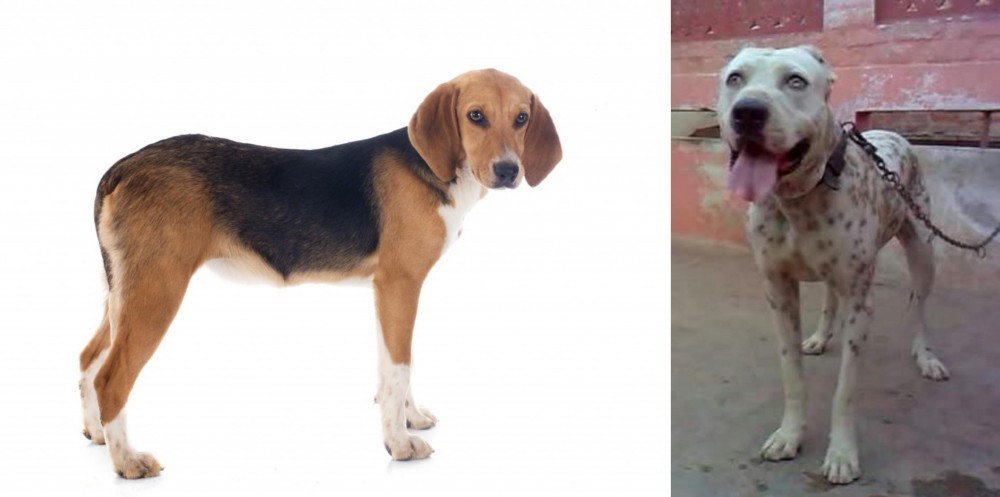 Beagle-Harrier is originated from France but Sindh Mastiff is originated from India. Beagle-Harrier may grow 34 cm / 13 inches shorter than Sindh Mastiff. Beagle-Harrier may weigh 43 kg / 94 pounds lesser than Sindh Mastiff. Both Beagle-Harrier and Sindh Mastiff has same life span. Both Beagle-Harrier and Sindh Mastiff has same litter size. Beagle-Harrier requires Moderate Maintenance. But Sindh Mastiff requires Low Maintenance
Beagle-Harrier is originated from France but Sindh Mastiff is originated from India. Beagle-Harrier may grow 34 cm / 13 inches shorter than Sindh Mastiff. Beagle-Harrier may weigh 43 kg / 94 pounds lesser than Sindh Mastiff. Both Beagle-Harrier and Sindh Mastiff has same life span. Both Beagle-Harrier and Sindh Mastiff has same litter size. Beagle-Harrier requires Moderate Maintenance. But Sindh Mastiff requires Low Maintenance
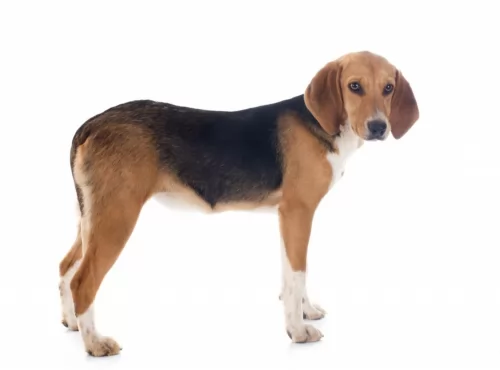 The Beagle Harrier, the breed that was made mixing the France Scent Hounds and a Beagle.
It is not quite sure if this breed was made on purpose or the mix of the breeds happened and resulted in a great dog so the breeding continued.
Since they are not large dogs as hounds, they are used to hunt small animals.
The Beagle Harrier, the breed that was made mixing the France Scent Hounds and a Beagle.
It is not quite sure if this breed was made on purpose or the mix of the breeds happened and resulted in a great dog so the breeding continued.
Since they are not large dogs as hounds, they are used to hunt small animals.
This first breeding took place in England, but after the 14th century, they were breed on purpose in France.
 The Sindh Mastiff or Alangu Mastiff is an ancient breed believed to have been useful for guarding war camps, but today he is both a guard dog and pet.
The Sindh Mastiff or Alangu Mastiff is an ancient breed believed to have been useful for guarding war camps, but today he is both a guard dog and pet.
There isn’t too much information available to us about the origins of this dog but it is thought that they came about from breeding the Indian Mastiff and the Alaunt.
He is likened to the Bully Kutta dog, a huge Mastiff breed from Pakistan. This dog is one of three mastiff type dog breeds to be found around Persia and India. Unfortunately because of its aggressive nature, it has been used for dog fighting.
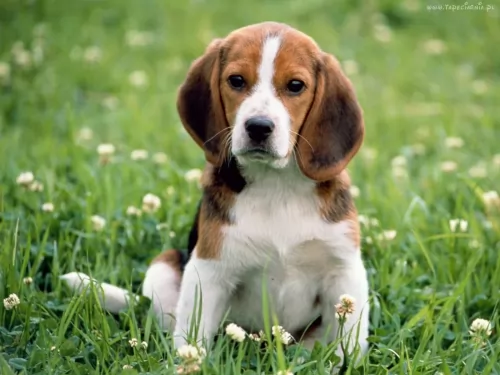 The Beagle Harrier is a scent hound that is described as a big sized Beagle or a small sized Harrier. This breed was developed from this two breeds, actually. Despite the looks of these breeds, the Beagle Harrier is an energetic kind of dog who gets very attached to his family. This medium sized pet comes in variations of colours and they are usually tricoloured. They usually have dark coloured eyes, white paws, and They usually grow up to have a very muscular body, but, if you don’t provide them with the daily activity they need, they will quickly get obese and unhappy.
The Beagle Harrier is a scent hound that is described as a big sized Beagle or a small sized Harrier. This breed was developed from this two breeds, actually. Despite the looks of these breeds, the Beagle Harrier is an energetic kind of dog who gets very attached to his family. This medium sized pet comes in variations of colours and they are usually tricoloured. They usually have dark coloured eyes, white paws, and They usually grow up to have a very muscular body, but, if you don’t provide them with the daily activity they need, they will quickly get obese and unhappy.
 The Alangu Mastiff is a huge dog, standing anything from 80 – 84cm in height and weighing 62 – 68kg. He is muscular and strong. He has a broad skull with small pricked ears, wide apart eyes and a thick neck.
The Alangu Mastiff is a huge dog, standing anything from 80 – 84cm in height and weighing 62 – 68kg. He is muscular and strong. He has a broad skull with small pricked ears, wide apart eyes and a thick neck.
The legs are powerful and muscled, the skin fairly loose over the body with hair that is short ad dense. The coat can be white, tan, fawn or brindle.
Sometimes the dog has a black mask. The tail is thick and long these days, although it used to be docked.
This dog has a domineering, ferocious nature and that is why it has been sought after as a guard dog. He is territorial and thought to be aggressive. He is therefore not a good choice of dog for first time dog owners. He is also not a good choice for when there are children in the home or even small pets.
He is strong willed and fairly difficult to train. Of course it is a known fact that a puppy turns out a lot like its owners. Good owners produce a good tempered dog, but you have to be careful with this dog as it has aggressive tendencies.
Certainly it will require a strong, firm consistent owner, and then the dog is capable of becoming loyal and devoted. Training and socialization are possible as he is intelligent, and it does help to make him more submissive to his human owners.
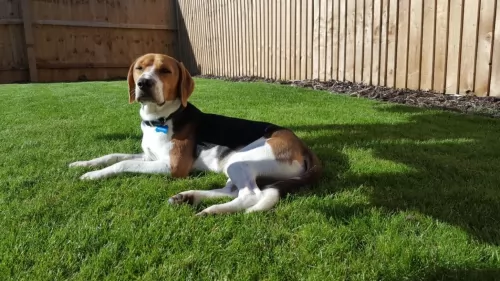 The Beagle Harrier, if trained properly and socialized while he was still a pup, will be the great playmate for any child. They get along with strangers, as well. We might say that they will get along with anybody who is ready to run and play with him. Children are most likely that kind of playdate, so it appears that they like children more. The Beagle Harrier is a great family pet, and he is great with babies, toddlers, teenagers… so don’t be afraid to leave the dog alone during the playdate!
The Beagle Harrier, if trained properly and socialized while he was still a pup, will be the great playmate for any child. They get along with strangers, as well. We might say that they will get along with anybody who is ready to run and play with him. Children are most likely that kind of playdate, so it appears that they like children more. The Beagle Harrier is a great family pet, and he is great with babies, toddlers, teenagers… so don’t be afraid to leave the dog alone during the playdate!
hunting, scent tracking, search dog
Some will say that the Beagle Harrier is one of the most desirable pets because of his loving and lively nature. They get along with almost anyone and they don’t mind living indoors if you have the time to take him out for a daily run each day. They will do great in a large group of people and any public places so you can take your Beagle Harrier with you anywhere you go.
Since the Beagle Harrier is placed in a group of the hound dogs, you must be aware that he will have the attitude of the pack leader. Once you got the Beagle Harrier puppy, you must start training and socializing him in order to grow the pet that will be easy to handle and accepted by the family and all the people around you, even strangers. They are very intelligent and they have a calm nature so they will be quite easy to train.
 Domineering and quite aggressive, particularly if brought up that way, the Sindh Mastiff has a fairly long history of dog fighting. He is an intelligent dog and should be trained and socialized. He is also very territorial. He isn’t suitable for first time dog owners as he does have a bit of a reputation as being a fairly ferocious dog.
Domineering and quite aggressive, particularly if brought up that way, the Sindh Mastiff has a fairly long history of dog fighting. He is an intelligent dog and should be trained and socialized. He is also very territorial. He isn’t suitable for first time dog owners as he does have a bit of a reputation as being a fairly ferocious dog.
However, you have to give this dog some credit, and with the right upbringing, proper training and socialization, he can make a loyal pet and companion for a strong, firm, patient, kind and consistent type of owner.
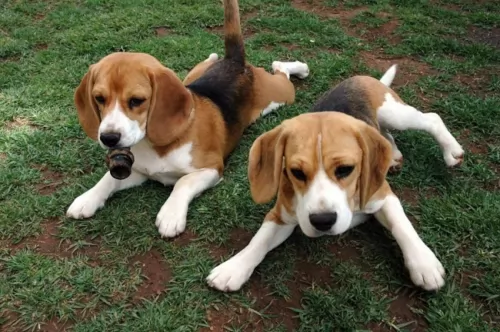 Almost every active dog suffers from joint diseases. Even though it’s generally a genetic disease, you can lower the chances of hip or elbow dysplasia by taking care of your dog’s weight, diet and daily exercise.
Almost every active dog suffers from joint diseases. Even though it’s generally a genetic disease, you can lower the chances of hip or elbow dysplasia by taking care of your dog’s weight, diet and daily exercise.
The Beagle Harrier has big ears that are always set down. That makes them ideal for the dirt accumulation, ear irritations and ear infections. Check his ears regularly and clean them at least once a week.
 The Sindh Mastiff is a healthy breed of dog who could develop any one of the main dog illnesses there are, although it is highly unlikely to get the diseases.
The Sindh Mastiff is a healthy breed of dog who could develop any one of the main dog illnesses there are, although it is highly unlikely to get the diseases.
A common problem with dogs is canine cancer, of which lymphosarcoma and bone cancer are common. Then you have to be aware of bloat or gastric dilatation volvulus, which is particular common in deep-chested dogs. The stomach dilates and twists, and blood supply is cut off.
This is a life threatening illness. Urinary tract infections and skin conditions are just some of the diseases your pet will need to contend with.
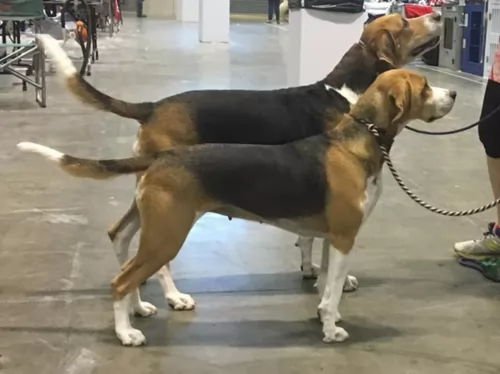 Since the Beagle Harrier is an active dog breed, they will need food for the active dogs. Make sure you provide them with quality food that will give them enough strength to get through the very active day, and not gain too much of the weight. It is very important that you don’t overfeed him because this breed quickly becomes obese. It is advisable to use treats while you train him to do new tricks, but be very careful with the amount you give to the dog.
Since the Beagle Harrier is an active dog breed, they will need food for the active dogs. Make sure you provide them with quality food that will give them enough strength to get through the very active day, and not gain too much of the weight. It is very important that you don’t overfeed him because this breed quickly becomes obese. It is advisable to use treats while you train him to do new tricks, but be very careful with the amount you give to the dog.
Puppies need to be fed only two times a day. Once you decide which brand of food you will use, stick with them until the dog is 6 months old. Make sure they have enough nutrients and the quality ingredients that will help them with growing strong and healthy bones.
If you want Beagle Harrier to grow up in a happy and healthy dog, make sure you provide him with quality food, lots of exercises and unconditional love. They are extremely loving and they get depressed if left alone. Grooming tips are very clear – they need a regular brush because shed a lot. The more you brush, the less hair you will find on your hands during the belly rubs.
If your Beagle Harrier is trained and socialized, the dog park will be the best daily activity for him. If there is no dog park near your house, take him to the bike ride, jogging, swimming, hiking, markets, parks… They love to be off the leash and with people but since they are the hound dogs, don’t be surprised if they get distracted by smelling something more interesting than the ball. They would love to grow up in a house with a large yard, but, if you live in the apartment, make sure that you take time for his daily activity.
 This is a low maintenance dog as the short coat will only require a brush twice a week. As you brush him take note of any unusual lumps you come across.
This is a low maintenance dog as the short coat will only require a brush twice a week. As you brush him take note of any unusual lumps you come across.
Also, while grooming him, check the inside of his ears and look for signs of redness and the possibility of an ear infection. Look into his eyes and make sure they are clear and bright.
Check inside his mouth, if he will allow you to, and make sure he doesn’t have any bad teeth. These could cause a lot of pain and also cause problems with body organs such as the heart and the kidneys.
This is a big dog that is going to need plenty of exercise. He is not suited to small spaces in the city but will require a fairly large property in the suburbs or the countryside. He will become frustrated and more dangerous to others if left day after day without exercise.
The Sindh Mastiff is an energetic dog, so it is important do ensure he has good food to eat to ensure he remains fit and energetic. For convenience, commercially manufactured dog foods can be a good choice, but only when you choose the better quality ones with vitamins and minerals in them.
Some of the inferior food brands load the food with bad fillers, colorants and preservatives and these can all make your pet sick. Try and give him some home made food too – nothing exotic – just plain boiled chicken, brown rice or pasta and spinach, sweet potatoes and carrots.
Your dog will thank you for such a plain diet as then he isn’t plagued by digestive problems. Chop it all up and add it into the dry kibble a couple of times a week. Try and include some raw meat into the diet occasionally to avoid skin problems. Always ensure a constant supply of fresh, cool water.